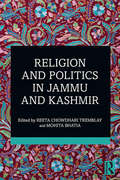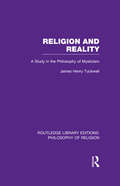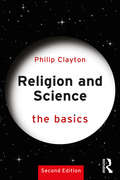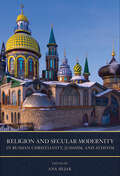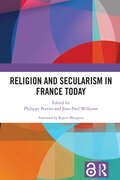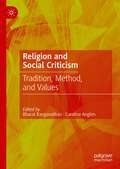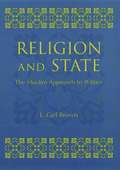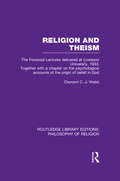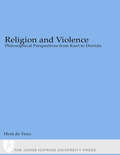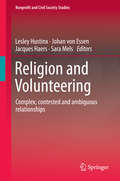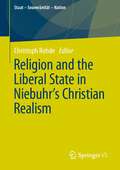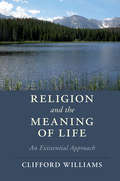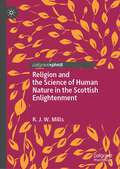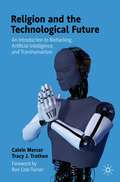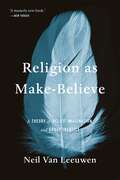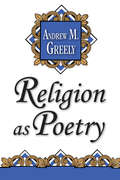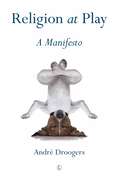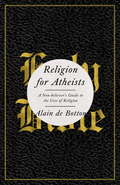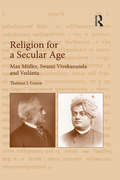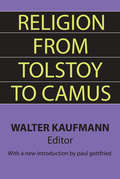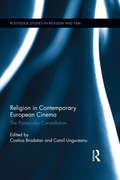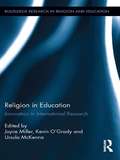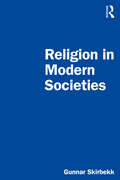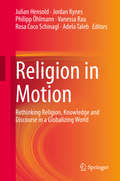- Table View
- List View
Religion and Politics in Jammu and Kashmir
by Mohita Bhatia Reeta Chowdhari TremblayThis book examines the shifting, non-linear relationship between religion, nationalism and politics in the state of Jammu and Kashmir, India. In the wake of the revocation of Article 370, the state’s plural and relatively harmonious society has come under multiple strains, with religion often informing day-to-day politics. The chapters in this volume: Trace the formation of the political entity of Jammu and Kashmir and the seemingly secular politics of its three regions Discuss the rise of militancy and resistance movements in the Kashmir Valley Highlight the intersection between everyday life, nationalism and resistance through a study of the literary traditions of Kashmir, contemporary resistance photography and everyday communalism located in the changing food practices of Hindu and Muslim communities Religion and Politics in Jammu and Kashmir will be an indispensable read for students and researchers of religion and politics, democratization and democracy, secularism, sociology, cultural studies and South Asian studies.
Religion and Rational Theology
by Immanuel Kant Allen W. Wood George Di GiovanniThis volume collects for the first time in a single volume all of Kant's writings on religion and rational theology. These works were written during a period of conflict between Kant and the Prussian authorities over his religious teachings. His final statement of religion was made after the death of King Frederick William II in 1797. The historical context and progression of this conflict are charted in the general introduction to the volume and in the translators' introductions to particular texts. All the translations are new with the exception of The Conflict of the Faculties, where the translation has been revised and re-edited to conform to the guidelines of the Cambridge Edition. As is standard with all the volumes in this edition, there are copious linguistic and explanatory notes, and a glossary of key terms.
Religion and Reality: A Study in the Philosophy of Mysticism (Routledge Library Editions: Philosophy of Religion)
by James Henry TuckwellThis discussion of the search for religious truth addresses a universal view of religion that can be termed ‘philosophical mysticism’ from a rational basis of experience. Originally published in 1915, this is a classic of theological thinking that investigates the fundamental nature of religion and ‘perfect’ experience.
Religion and Science: The Emergence Of Spirit In The Natural World. Frankfurt Templeton Lectures 2006 (The Basics #13)
by Philip ClaytonReligion and science are arguably the two most powerful social forces in the world today. But where religion and science were once held to be compatible, many people now perceive them to be in conflict. This unique book provides the best available introduction to the burning debates in this controversial field. Examining the defining questions and controversies, renowned expert Philip Clayton presents the arguments from both sides, asking readers to decide for themselves where they stand: • science or religion, or science and religion? • history and philosophy of science • the role of scientific and religious ethics – modifying genes, extending life, and experimenting with human subjects • religion and the environmental crisis • the future of science vs. the future of religion. Thoroughly updated throughout, this second edition explores religious traditions from around the world and provides insights from across the sciences, making this book essential reading for all those wishing to come to their own understanding of some of the most important debates of our day.
Religion and Secular Modernity in Russian Christianity, Judaism, and Atheism (NIU Series in Slavic, East European, and Eurasian Studies)
by Edited by Ana SiljakReligion and Secular Modernity in Russian Christianity, Judaism, and Atheism is a multifaceted account of the engagement between religion and the secular in Russia's Christian, Jewish, and atheist traditions. Ana Siljak brings together an interdisciplinary group of leading scholars to present unique perspectives on the secularization dynamic in Russia and the Soviet Union, telling stories about theologians, sects, churches, poets, and artists. From the Jewish Christian priest Alexander Men, to the cross-dressing poet Zinaida Gippius, to the Soviet promoter of Yiddish theater Solomon Mikhoels, Religion and Secular Modernity in Russian Christianity, Judaism, and Atheism gives a voice to a variety of actors who have grappled with the possibilities of faith and unbelief in an industrialized, modern, and seemingly secular world. Now more than ever, as one narrative of Russia's religious history dominates official Russian accounts, alternative perspectives of the relationship between Russian religion and secularism should be highlighted and emphasized.
Religion and Secularism in France Today
by Jean-Paul Willaime Philippe PortierThis volume explores the dynamic life of religion and politics in France. The separation of church and state and the autonomy of school education from religion are the two fundamental pillars of France as a secular republic. The historical construction of French secularism (laïcité) was particularly marked by the strong opposition between the state and the Catholic church. However, the religious disaffiliation of a significant proportion of the French strengthened state secularism, which gradually became more consensual – despite some persisting tensions in the school context. Yet, in the last decades, several factors have revived public debate on laicity: the quarrel over ‘sects’ and new religious movements; controversies over Islam, today the second-largest religion in France; and, more recently, dispute over bioethics. Faced with these challenges, laicity as well as the religious groups involved have been changing. The authors of this book, ranking amongst the best French experts in the study of religion and secularism, introduce the reader to a living and lived laicity influenced by the social and religious dynamics of contemporary France. They demonstrate that the configurations of French secularism are both more flexible and complex than they appear to be. The volume investigates the extent to which the French idea of secularization has been pushed to be more thorough and radical in its interaction with its other European counterparts. A key work on French political thought, this volume will be of great interest to scholars and researchers of international politics, political philosophy, political sociology, and religion and politics.
Religion and Social Criticism: Tradition, Method, and Values
by Bharat Ranganathan Caroline AnglimThis volume brings together emerging and established religious ethicists to investigate how those in the field carry forward the practice and tradition of social criticism and, at the same time, how social criticism informs the scholarly values of their field. Contributors reflect on the nature of the moral subject and the ethical weight of human dignity and consider the limits and possibilities of religious humanism in orienting the work of social criticism. They compare religious sources and forms of research in religious ethics to secular sources and the tradition of liberal social criticism. And they offer proposals for how religious ethics can help humanists navigate our complex and multicultural moral landscape and what this field reveals about the ultimate ends of humanistic scholarship.
Religion and State: The Muslim Approach to Politics
by L. BrownIf Westerners know a single Islamic term, it is likely to be jihad, the Arabic word for "holy war." The image of Islam as an inherently aggressive and xenophobic religion has long prevailed in the West and can at times appear to be substantiated by current events. L. Carl Brown challenges this conventional wisdom with a fascinating historical overview of the relationship between religious and political life in the Muslim world ranging from Islam's early centuries to the present day. Religion and State examines the commonplace notion—held by both radical Muslim ideologues and various Western observers alike—that in Islam there is no separation between religion and politics. By placing this assertion in a broad historical context, the book reveals both the continuities between premodern and modern Islamic political thought as well as the distinctive dimensions of modern Muslim experiences. Brown shows that both the modern-day fundamentalists and their critics have it wrong when they posit an eternally militant, unchanging Islam outside of history. "They are conflating theology and history. They are confusing the oughtand the is," he writes. As the historical record shows, mainstream Muslim political thought in premodern times tended toward political quietism.Brown maintains that we can better understand present-day politics among Muslims by accepting the reality of their historical diversity while at the same time seeking to identify what may be distinctive in Muslim thought and action. In order to illuminate the distinguishing characteristics of Islam in relation to politics, Brown compares this religion with its two Semitic sisters, Judaism and Christianity, drawing striking comparisons between Islam today and Christianity during the Reformation. With a wealth of evidence, he recreates a tradition of Islamic diversity every bit as rich as that of Judaism and Christianity.
Religion and Theism: The Forwood Lectures Delivered at Liverpool University, 1933. Together with a Chapter on the Psychological Accounts of the Origin of Belief in God (Routledge Library Editions: Philosophy of Religion)
by Clement C.J. WebbFour lectures on the Philosophy of Religion are included in this compact book along with an extra chapter on the psychology of belief in God. In a search for an acceptable theism, the author examines religious faith and human personality via many theories and facets of thinking, referring to psychologists, theologians and philosophers who have battled with similar questions. Originally published a year after the lectures were presented, this is an interesting classic volume by a well-known theorist of the early Twentieth Century.
Religion and Violence: Philosophical Perspectives from Kant to Derrida
by Hent de VriesChosen as an Outstanding Academic Title for 2003 by Choice MagazineOriginally published in 2002. Does violence inevitably shadow our ethico-political engagements and decisions, including our understandings of identity, whether collective or individual? Questions that touch upon ethics and politics can greatly benefit from being rephrased in terms borrowed from the arsenal of religious and theological figures, because the association of such figures with a certain violence keeps moralism, whether in the form of fideism or humanism, at bay. Religion and Violence: Philosophical Perspectives from Kant to Derrida's careful posing of such questions and rearticulations pioneers new modalities for systematic engagement with religion and philosophy alike.
Religion and Volunteering
by Jacques Haers Lesley Hustinx Johan Von Essen Sara MelsReligion is considered a key predictor of volunteering: the more religious people are, the more likely they are to volunteer. This positive association enjoys significant support in current research; in fact, it could be considered the 'default perspective' on the relationship between both phenomena. In this book, the authors claim that, although the dominant approach is legitimate and essential, it nonetheless falls short in grasping the full complexity of the interaction between religion and volunteering. It needs to be recognized that there are tensions between religion and volunteering, and that these tensions are intensifying as a result of the changing meaning and role of religion in society. Therefore, the central aim and contribution of this book is to demonstrate that the relationship between religion and volunteering is not univocal but differentiated, ambiguous and sometimes provocative. By introducing the reader to a much wider landscape of perspectives, this volume offers a richer, more complex and variable understanding. Apart from the established positive causality, the authors examine tensions between religion and volunteering from the perspective of religious obligation, religious change, processes of secularization and notions of post-secularity. They further explore how actions that are considered altruistic, politically neutral and motivated by religious beliefs can be used for political reasons. This volume opens up the field to new perspectives on religious actors and on how religion and volunteering are enacted outside Western liberal and Christian societies. It emphasizes interdisciplinary perspectives, including theology, philosophy, sociology, political science, anthropology and architecture.
Religion and the Liberal State in Niebuhr's Christian Realism (Staat – Souveränität – Nation)
by Christoph RohdeThis book intends to analyze Reinhold Niebuhr's understanding of the state in his Christian Realism. Although his overall notion was thoroughly analyzed in different disciplines and respects, this specific focus can be diagnosed as a lacuna. The task of this book is to develop a hypothesis in terms of under what political, social, organizational or intellectual context Niebuhr made use of what definition of the state. When did he support the extension of state power (e. g. in war times, during economic crisis) and when did he criticize tendencies toward autocratic structures inside Western style democracies?
Religion and the Meaning of Life: An Existential Approach (Cambridge Studies in Religion, Philosophy, and Society)
by Clifford WilliamsAs humans, we want to live meaningfully, yet we are often driven by impulse. In Religion and the Meaning of Life, Williams investigates this paradox – one with profound implications. Delving into felt realities pertinent to meaning, such as boredom, trauma, suicide, denial of death, and indifference, Williams describes ways to acquire meaning and potential obstacles to its acquisition. This book is unique in its willingness to transcend a more secular stance and explore how one's belief in God may be relevant to life's meaning. Religion and the Meaning of Life's interdisciplinary approach makes it useful to philosophers, religious studies scholars, psychologists, students, and general readers alike. The insights from this book have profound real-world applications – they can transform how readers search for meaning and, consequently, how readers see and exist in the world.
Religion and the Science of Human Nature in the Scottish Enlightenment
by R.J.W. MillsThis book examines how enlightened Scottish social theorists c.1740 to c.1800 understood the origin and development of religion. Challenging scholarly disregard for the topic, it shows how most prominent thinkers of the Scottish Enlightenment thought deeply about the relationship between religion, human nature and historical change. The Scots viewed this relationship as an important strand within the study of the 'science of human nature' and the 'history of man.' The fruits of this investigation were a sophisticated and innovative account of religious change that is characterized by a striking modernity and naturalism, even by the more devout theorists. The views of the literati surveyed here need to be incorporated into our larger histories of the 'science of religion' as much as they do into our understanding of the social theory of the Scottish Enlightenment.
Religion and the Technological Future: An Introduction to Biohacking, Artificial Intelligence, and Transhumanism
by Calvin Mercer Tracy J. TrothenWe live in an age of rapid technological advancement. Never before has humankind wielded so much power over our own biology. Biohacking, the attempt at human enhancement of physical, cognitive, affective, moral, and spiritual traits, has become a global phenomenon. This textbook introduces religious and ethical implications of biohacking, artificial intelligence, and other technological changes, offering perspectives from monotheistic and karmic religions and applied ethics. These technological breakthroughs are transforming our societies and ourselves fundamentally via genetic modification, tissue engineering, artificial intelligence, robotics, the merging of computer technology with human biology, extended reality, brain stimulation, and nanotechnology. The book also considers the extreme possibilities of mind uploading, cryonics, and superintelligence. Chapters explore some of the political, economic, sociological, and psychological dimensions of these advances, with bibliographies for further study and questions for discussion. The technological future is here – and it is up to us to decide its moral and religious shape.
Religion as Make-Believe: A Theory of Belief, Imagination, and Group Identity
by Neil Van LeeuwenTo understand the nature of religious belief, we must look at how our minds process the world of imagination and make-believe.We often assume that religious beliefs are no different in kind from ordinary factual beliefs—that believing in the existence of God or of supernatural entities that hear our prayers is akin to believing that May comes before June. Neil Van Leeuwen shows that, in fact, these two forms of belief are strikingly different. Our brains do not process religious beliefs like they do beliefs concerning mundane reality; instead, empirical findings show that religious beliefs function like the imaginings that guide make-believe play.Van Leeuwen argues that religious belief—which he terms religious “credence”—is best understood as a form of imagination that people use to define the identity of their group and express the values they hold sacred. When a person pretends, they navigate the world by consulting two maps: the first represents mundane reality, and the second superimposes the features of the imagined world atop the first. Drawing on psychological, linguistic, and anthropological evidence, Van Leeuwen posits that religious communities operate in much the same way, consulting a factual-belief map that represents ordinary objects and events and a religious-credence map that accords these objects and events imagined sacred and supernatural significance.It is hardly controversial to suggest that religion has a social function, but Religion as Make-Believe breaks new ground by theorizing the underlying cognitive mechanisms. Once we recognize that our minds process factual and religious beliefs in fundamentally different ways, we can gain deeper understanding of the complex individual and group psychology of religious faith.
Religion as Poetry
by Andrew M. GreeleyReligion as Poetry continues in the grand tradition of the sociology of religion pioneered by Emile Durkheim, Max Weber, and Talcott Parsons, among other giants in intellectual history. Too many present-day sociologists either ignore or disparage religious currents. In this provocative book, Andrew M. Greeley argues that various religions have endured for thousands of years as poetic rituals and stories. Religion as Poetry proposes a theoretical framework for understanding religion that emphasizes insights derived from religious stories. By virtue of his own rare abilities as a novelist as well as sociologist, Greeley is uniquely qualified for this task.Greeley first considers classical theories of the sociology of religion, and then, drawing upon them, he explicates his own interpretation. He critically examines the viewpoint that society is becoming more secular, and that religion is declining. He observes that this theory stands in the way of persuading sociologists that religion is still worth studying. In contrast, Greeley is interested in why religions persist despite secular trends and alongside them. He argues that it is poetic elements that touch the human soul. Greeley then sets out to test this viewpoint.Greeley maintains that his theory is not the only, or necessarily even the best approach to study religion. Rather, it is his contention that it uniquely provides sociologists with perspectives on religion that other theories too often overlook or disregard. Religion as Poetry, an original and intriguing study by a distinguished social scientist and major novelist, will be enjoyed and evaluated by sociologists, ' theologians, and philosophers alike.
Religion at Play: A Manifesto
by Andre DroogersIs a powerful position a guarantee that a religion will continue? Does God take sides in religious power struggles? Can God survive religious exclusivity and diversity? Is God migrating from out there to in here? Is religion sustainable in the long run? In seeking answers to these questions, this book explores the possibilities afforded by playful religion. Religion has playful origins, but this aspect is forgotten as soon as institutional power becomes self-serving insteadof subservient. Power changes the very essence of religion. Virtually all religions are distorted versions of a playful original. Institutionalization is religion's curse, not its blessing. Apparent success hides the failure of religion to be faithful to its original intent. This book helps find the way back from bordering to inclusivity and openness.
Religion for Atheists
by Alain De BottonWhat if religions are neither all true nor all nonsense? The long-running and often boring debate between fundamentalist believers and non-believers is finally moved forward by Alain de Botton's inspiring new book, which boldly argues that the supernatural claims of religion are entirely false--but that it still has some very important things to teach the secular world. Religion for Atheists suggests that rather than mocking religion, agnostics and atheists should instead steal from it--because the world's religions are packed with good ideas on how we might live and arrange our societies. Blending deep respect with total impiety, de Botton (a non-believer himself) proposes that we look to religion for insights into how to, among other concerns, build a sense of community, make our relationships last, overcome feelings of envy and inadequacy, inspire travel and reconnect with the natural world. For too long non-believers have faced a stark choice between either swallowing some peculiar doctrines or doing away with a range of consoling and beautiful rituals and ideas. At last, in Religion for Atheists, Alain de Botton has fashioned a far more interesting and truly helpful alternative.
Religion for a Secular Age: Max Müller, Swami Vivekananda and Vedānta
by Thomas J. GreenReligion for a Secular Age provides a transnational history of modern Vedānta through a comparative study of two of its most important exponents, Friedrich Max Muller (1823–1900) and Swami Vivekananda (1863–1902). This book explains why Vedānta's appeal spanned the ostensibly very different contexts of colonial India and Victorian Britain and America, and how this ancient form of thought was translated by Muller and Vivekananda into a modern form of philosophy or religion. These religiously-committed men attempted to reconcile religion with modernity by appealing to Advaita (literally, 'non-dualistic') Vedānta's monistic interpretation of reality. The 'scientific' study of religion allegedly demonstrated the evolutionary superiority of Vedānta and the possibility of religion's survival in 'the light of modern science'. They believed Vedānta could also provide the religious basis for moral engagement in this world, even as the hold of orthodox Christianity and traditional Hinduism appeared to be weakening. Vedānta thus served as a way of articulating a form of religion suitable for a secular age – religion which has embraced modern forms of thought while breaking away from creeds, scriptures and institutions to thrive in the spheres of public debate of London, Calcutta and New York.
Religion from Tolstoy to Camus
by Walter Kaufmann Paul GottfriedWalter Kaufmann devoted his life to exploring the religious implications of literary and philosophical texts. Deeply skeptical about the human and moral benets of modern secularism, he also criticized the quest for certainty pursued through dogma. Kaufmann saw a risk of loss of authenticity in what he described as unjustied retreats into the past. This is a compilation of signicant texts on religious thought that he selected and introduced.
Religion in Contemporary European Cinema: The Postsecular Constellation (Routledge Studies in Religion and Film)
by Camil Ungureanu Costica BradatanThe religious landscape in Europe is changing dramatically. While the authority of institutional religion has weakened, a growing number of people now desire individualized religious and spiritual experiences, finding the self-complacency of secularism unfulfilling. The "crisis of religion" is itself a form of religious life. A sense of complex, subterraneous interaction between religious, heterodox, secular and atheistic experiences has thus emerged, which makes the phenomenon all the more fascinating to study, and this is what Religion in Contemporary European Cinema does. The book explores the mutual influences, structural analogies, shared dilemmas, as well as the historical roots of such a "post-secular constellation" as seen through the lens of European cinema. Bringing together scholars from film theory and political science, ethics and philosophy of religion, philosophy of film and theology, this volume casts new light on the relationship between the religious and secular experience after the death of the death of God.
Religion in Education: Innovation in International Research (Routledge Research in Religion and Education)
by Joyce Miller Kevin O’Grady Ursula McKennaThis volume explores numerous themes (including the influence of ethnography on religious education research and pedagogy, the interpretive approach to religious education, the relationship between research and classroom practice in religious education), providing a critique of contemporary religious education and exploring the implications of this critique for initial and continuing teacher education.
Religion in Modern Societies
by Gunnar SkirbekkIn Religion in Modern Societies, Gunnar Skirbekk examines the challenging relationship between religion, science, and the state, and explores literature on religion in Western and Muslim-majority societies. Through the lens of modernity theory and the perspective of philosophy of science, key issues are discussed, including freedom of expression and the interaction between religion and modern institutions. Chapters include: • Science and Religion • The Problem of Evil • Freedom of Expression • Multiculturalism and the Welfare State • Religion as Social Integration • Islam in a Historical Class Perspective The topics discussed are universal issues which in principle hold relevance for all of us living in a modern science-based world and societies in crisis. This volume is essential reading to those with an interest in philosophy of religion, religion and science, the work of Jürgen Habermas, the theory of modernization, and the politicization of religion.
Religion in Motion: Rethinking Religion, Knowledge and Discourse in a Globalizing World
by Philipp Öhlmann Julian Hensold Jordan Kynes Vanessa Rau Rosa Coco Schinagl Adela TalebThis volume offers innovative approaches to the study of religion. It brings together junior and senior scholars from the Global North and South. The contributors also explore the context-specific formations of religion and religious knowledge production in an increasingly instable and incalculable, globalized world.In the spirit of the challenging slogan, “Religion in Motion. Rethinking Religion, Knowledge and Discourse in a Globalizing World,” the book bundles voices from a great variety of cultural and academic backgrounds. It offers readers a cross-continental exchange of innovative approaches in the study of religion. Coverage intersects religion, gender, economics, and politics. In addition, it de-centers European perspectives and brings in perspectives from the Global South.Chapters examine such topics as feminine power and agency in the Ilê Axé Oxum Abalô, queering the Trinity, and faith and professionalism in humanitarian encounters in post-earthquake Haiti. Coverage also explores notions of development in African initiated churches and their implications for development policy, the study of religion as the study of discourse construction, rethinking the religion/secularism binary in world politics, and more. This book will appeal to students and researchers with an interest in Religion and Society, Philosophy and Religion, and Religion and Gender.
